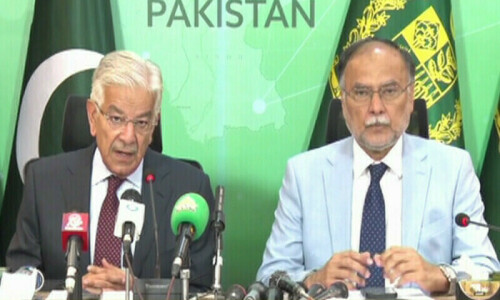THE recent attempt by Tehreek-i-Labbaik Pakistan (TLP) to incite violence against the country’s top judge highlights the disturbing level of radicalisation among the Barelvis, who were once considered a peace-loving school of thought, being the followers of Sufi Islam.
Emerging in 2015, the TLP made itself known on Pakistan’s vast religio-political horizon within a year, building its credentials on the issue of Mumtaz Qadri’s execution. Qadri was the police guard who shot and killed Punjab governor Salmaan Taseer in 2011 over his support for blasphemy accused Aasia Bibi.
Under the leadership of fiery orator Khadim Hussain Rizvi, the group fast climbed the popularity ladder, overshadowing pirs — the traditional leaders of the Barelvi sect — and scores of other groups within their ranks.
Since its inception nine years ago, it has forced three elected governments to bow to its demands and accept the legitimacy of its philosophy as a condition for ending its protests; in November 2017, November 2020, October 2021, and most recently in July 2024.
TLP’s apparently rising political influence made other parties to adopt some of its slogans — a liberal party like the PPP in a Lahore by-election hung banners carrying the slogan “Labbaik Ya Rasool Allah” and pictures of party founder Zulfikar Ali Bhutto, portraying him as Mujahid-i-Khatm-i-Nabuwat in a reference to the constitutional amendment by his regime, declaring Ahmadis to be non-Muslims.
TLP’s disturbing campaign against top judge lifts lid from the uncomfortable truth that the genie of radicalisation is well and truly out of the bottle
It was the Sunni Tehreek (ST), not TLP, which was the first bastion of radicalism among the Barelvis, says Nawfil Saleemi, an academic at the Lahore University of Management Sciences. “But ST largely remained confined to its base in Karachi and its impact evaporated into thin air when most of its leadership was killed in a terrorist attack during a Milad ceremony,” he recalled.
In his view, religious radicalism has a historical context in South Asia, including Pakistan — both in the pre- and post-Partition eras. Extremism has also permeated religious and nationalist discourse across the globe as we witness this ‘moral panic’ in anti-immigration voices in Europe, but the emergence of a new, confrontational leadership here is the basic reason behind the recent rise in extremism. The establishment, Mr Saleemi argues, only tried to benefit from it, as was the case with the 2017 Faizabad sit-in.
Senior journalist Badar Alam feels that the de-politicisation of Pakistani society during the last three decades or so has provided space to aggressive Barelvi elements, who are hurt by the feeling that the state is only promoting the Deobandi school of thought.
Massive funding, both from local and foreign actors, is providing the impetus for this, which is great of concern to all, he says. This, coupled with the changing priorities of the American and local establishment to counter the rising trend of terrorism among Deobandi and Salafi schools, provided the Barelvis an opportunity to establish themselves as a force to be reckoned with, he adds.
The state’s inaction or failure to push back against this tide is making matters worse, says Mr Saleemi, adding that global influences i.e. blasphemous acts being perpetrated in other countries, as well as the limitless outreach available to such groups through social media, are leading more and more people to radicalisation, he says.
“By overlooking the threat or not offering resistance, the state, police as well as political parties are creating an enabling environment for these elements,” Mr Saleemi laments.
By striking some sort of deal with the TLP each time, though it clashed with the police during every sit-in and march, the state has emboldened the outfit. “It is expanding its list of demands, like it recently begun opposing the slaughtering of sacrificial animals on Eidul Azha by Ahmadis. Their stance will only intensify with the passage of time, in the absence of [any resistance] from the state,” he warns.
Mr Alam feels that unlike the threat posed by groups such as the banned Tehreek-i-Taliban Pakistan (TTP) and other militant groups, the TLP’s brand of radicalisation is more dangerous. In the case of the former, one knows where the enemy lies and may protect oneself by avoiding contact with such elements. But in the case of the TLP, anyone may become a hitman against anyone, and at any time.
About how to reverse the situation, Mr Saleemi asserts that the state has reached a blind alley by amending anti-blasphemy laws in the 1980s and a return from that seems difficult.
Endorsing this view, Mr Alam suggests the state must give space to political parties, who, in return should organise themselves down to grass-roots level, as in the past.
Foreign funding, if there is any, should be traced and effectively blocked; the madressah system should be reformed to quell the promotion of sectarianism, while open discourse should be re-introduced in mainstream education, so future generations can be taught to know better.
Published in Dawn, August 15th, 2024












































